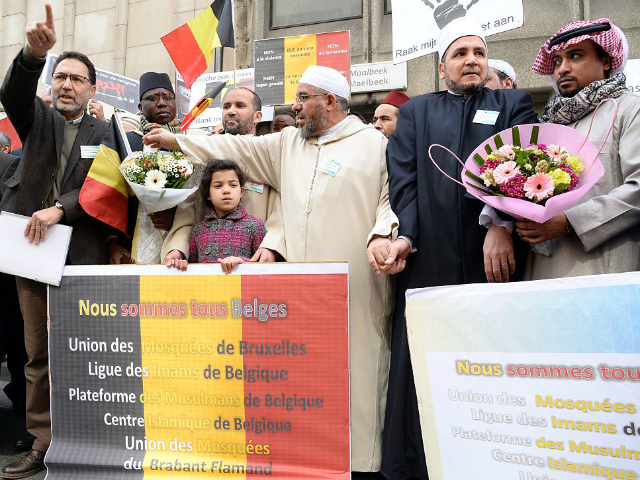Elites brought about a “profound transformation” of Belgian society without any public debate by manipulating immigration figures as more than one million migrants poured in, a liberal senator has alleged.
Writing in Le Figaro, Alain Destexhe said the realities of demographic change are being concealed across Europe by “the multiculturalist lobby which dominates universities, NGOs, public institutions and the media”.
“Like France, Belgium has changed dramatically in a relatively short time, and was transformed into a mass immigration nation without any public debate,” he said, noting that its population rose from 10.2 million to 11.3 million in a relatively short period as a result of mass migration.
Between 2000 and 2010, Belgium’s net migration figures ran “nine times higher than in the Netherlands, four times higher than in France and Germany, and even greater than in the U.S.” in proportion to the nation’s size.
“Yet this statistical reality has been concealed from the population,” writes Destexhe, a doctor who spent a decade serving regions struck by war and natural disaster, and was appointed Médecins Sans Frontières’s first secretary-general.
Belgium: Authorities mired in almost 200 anti-terror investigations since the beginning of 2017. https://t.co/jHK2cSYgGR
— Breitbart London (@BreitbartLondon) August 26, 2017
“Because it’s a given that mass migration must be forced on Belgium, the elites and the media who decide what people are allowed to talk about are careful not to reveal statistics that would cause alarm,” he said.
In his essay for the French broadsheet, the Reformist Movement senator details a number of methods by which he says immigration data is manipulated to keep Belgians in the dark, and thereby prevent any open debate over the “exponential consequences” migration is having on the small country’s demographics.
“Even Eurostat, the EU’s official statistics agency, blithely mixes data and ideology,” he said, pointing to its annual immigration reports, which claim mass migration is “good for Europe” and that the continent needs more of it.
Migration figures are almost always presented as annual flow, and the media “heavily emphasises” decreases in immigrant numbers compared to the previous year, while downplaying increases.
“A 10- or 20-year statistic would never be used,” Destexhe remarks, also noting that — with “a procession of bureaucrats and lobbyists” working in EU capital Brussels — the year-on-year figures in which data is presented allows the media to “create the false impression that most immigrants to Belgian are European”.
“This reassuring but incorrect picture is always greatly emphasised”, he writes, pointing out that long-term analysis shows that while migrants from Europe return to their homelands after a few years of work, “Moroccans, Algerians, Turks … have the indisputable tendency of settling in Belgium forever”.
‘Insecurity’ Drives Soaring Number of Belgians to Apply for Gun Licenses https://t.co/TTHz865gc9 pic.twitter.com/wKZhzpklI3
— Breitbart London (@BreitbartLondon) January 3, 2017
Already one of Europe’s most densely populated nations, Belgium’s population is set to grow by another couple of million in the coming decades — yet this phenomenon is never publicly linked to mass migration, Destexhe points out, asserting it is only ever presented as a “demographic boom”.
“There are significant social problems. For example, 90 per cent of welfare recipients in Brussels have a migrant background, there is significant stress on public services such as in administration, hospitals and in public transport, with the number of trips having doubled in 15 years,” he explains.
“Schools have had to create more than 40,000 additional school places in 10 years, and the obviously considerable costs relating to all of this are either never addressed at all (and therefore never debated), or else presented as if they were totally foreign to the immigration issue.”
Declaring it urgent that Europeans “at least become aware of the gravity of the situation”, Destexh ends his essay with a call for “the unvarnished presentation of statistics and a debate on their consequences”.
“An honest title for demographic forecasting would be ‘There will soon be a million more people in Belgium, most of whom will be Muslims’,” he writes, calling attention to a recent Pew Forum on Religious and Public Life report.
Just One In 10 Belgians Think Migrants Benefit Society https://t.co/2DKbZTf6eC pic.twitter.com/JQnqXItNy7
— Breitbart London (@BreitbartLondon) August 12, 2016
“But that kind of title would invariably create a public debate on demographics, population density, and Muslim integration, and so would be out of the question for European elites because it would make people very worried,” he remarked wryly.
Indeed, the Belgian media panicked last month over a study which found that two-thirds of the population feel their nation is being “increasingly invaded”, while 77 per cent said they “no longer feel at home” as a result of mass migration.
The purpose of the report was finding ways to tackle populism at a time societies in the West must undergo “permanent transformations”, according to the project’s This is Not a Crisis foundation.
As reported by Breitbart London, the foundation states that its mission is to replace a Europe in which people are “nationalist, tribal, xenophobic, withdrawn, closed [and] nostalgic of borders” with one that is “cosmopolitan, universalist, inclusive, open, with a strong legitimate citizenship and appreciation for diversity”.

COMMENTS
Please let us know if you're having issues with commenting.